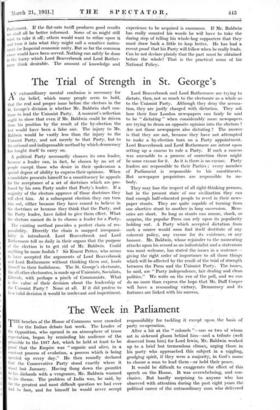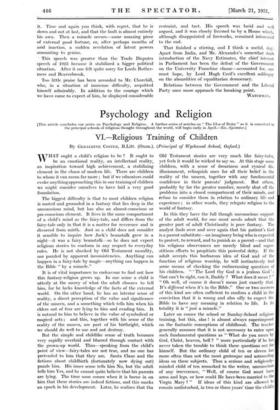The Week in Parliament
THE benches of the House -of Commons were crowded for the Indian debate last week. The Leader of the Opposition, who opened in an atmosphere of tense expectation, began by • reminding his audience of the preamble to the. 1917 Act, which he held at least to be proof that . the Empire was " organic - and alive, in a constant process of evolution, a process which is being speeded up every day." He then roundly declared that the Conservative .Party stood exactly where it stood last January. Having flung down the gauntlet to his diehards with a Nengeance, Mr. Baldwin warmed to his theme. The problem of India was, he said, by far the greatest and most difficult question we had ever had to face, and for himself he would never accept responsibility for. tackling it except upon the basis of party co-operation.
After a hit at the " colonels "—one or two of whom sat in sickened gloom behind him—and a tribute (well deserved from him) for Lord Irwin, Mr. Baldwin worked up to a brief but tremendous climax, urging those. in his party who approached this subject in a niggling, grudging spirit, if they were a majoxity, in God's name to choose a man to lead them--or hold their peace.
It would be difficult to exaggerate the effect of this speech on the House. It was overwhelming, and con- clusive.. But hardly surprising. to anyone who has observed with attention during the past eight years the political career of the extraordinary man who delivered it. Time and again you think, with regret, that he is down and out at last, and that the fault is almost entirely his own. Then a miracle occurs—some amazing piece of external good fortune, or, after perhaps months of arid inaction, a sudden revelation of latent powers amounting to genius.
This speech was greater than the Trade Disputes speech of 1925 because it stabilized a bigger political situation. After it one felt quite sorry for Lords Rother- mere and Beaverbrook.
Too little praise has been accorded to Mr. Churchill, who, in a situation of immense difficulty, acquitted himself admirably. In addition to the courage which we have come to expect of him, he displayed considerable restraint, and tact. His speech was lucid and well argued, and it was closely listened to by a House which, although disappointed of fireworks, remained interested to the end.
That finished a stirring, and I think a useful, day. Apart from India, and Mr. Alexander's somewhat drab introduction of the Navy Estimates, the chief interest in Parliament has been the defeat- of the Government on the University Franchise clause—accounted for, one must hope, by Lord Hugh Cecil's excellent soliloquy on the absurdities of equalitarian democracy.
Relations between the Government and the Liberal Party once more approach ,the breaking point.
WATCHMAN.



















































 Previous page
Previous page